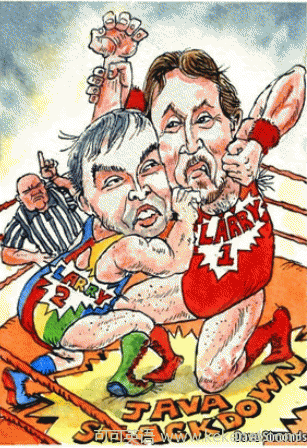
Business
商业
An intellectual-property exchange
知识产权交易所
Marketplace of ideas
创意市场
A new financial exchange hopes to make it easier to trade patent rights
一个崭新的金融交易所希望让专利权的交易变得更容易
THE technology industry is at war over intellectual property. On May 7th the first round of a three-part fight between Oracle and Google over patent and copyright claims relating to the Java programming language ended in a decision that denied outright victory to either firm. Apple, Samsung and others are fighting over smartphone patents. Facebook and Yahoo! are at loggerheads over internet patents. Accusations abound that innovation is taking a back seat to litigation. Only the lawyers are smiling.
科技业界打响了知识产权保卫战。甲骨文和Google之间关于Java编程语言的专利和版权的战斗拉开了这场由三部分组成的保卫战的序幕。2012年5月7日,这第一轮战斗以双方都没有得到彻底胜利宣告结束。苹果、三星以及行业内其他企业正在争夺智能手机专利权。Facebook和雅虎在互联网专利上发生了冲突。指控比比皆是,如今在诉讼面前科技创新只能靠边站。只有律师军团正微笑着。
All of which makes this a good time to launch a new approach to trading intellectual property, says Gerard Pannekoek, the boss of IPXI, a new financial exchange that lets companies buy, sell and hedge patent rights, just like any other asset. The idea is to offer a patent or group of patents as "unit licence rights" (ULRs), which can be bought and sold like shares. A ULR grants a one-time right to use a particular technology in a single product: a new type of airbag sensor in a car, say. If a company wants to use the technology in 100,000 cars, it buys 100,000 ULRs at the market price. ULRs are also expected to be traded on secondary markets.
芝加哥国际知识产权交易所(IPXI)的老板杰拉德Pannekoek称,所有这些专利侵权诉讼案件制造了一个很好的时机来启动一个新的方法来交易知识产权。芝加哥知识产权交易所是一个新的金融交易所,在这里就像任何其他资产一样企业可以购买、销售、对冲专利权。这个主意就是提供一项专利或是作为一个许可权单元的专利组,这些都可以像股票一样进行购买抛售。一个URL授权在一个产品中一次性应用某项技术,就像是一辆汽车上的一种新型的安全气囊传感器。如果一个公司想在10万辆汽车上使用这项技术,那么他得要以市场价购买10万份专利许可。专利许可预计也将会在二级市场进行交易。
This is simpler, faster and cheaper than the lawyer-intensive process of negotiating bilateral licences for intellectual property, the high cost of which discriminates against small companies, leaves patents unused on the shelf and hampers innovation. IPXI's approach does not work for all types of intellectual property-it does not allow exclusive licensing, for example-but should make it easier for companies to make money from their inventions. "It's a great form of non-dilutive funding for start-ups," suggests Mr Pannekoek.
相对于知识产权双边谈判的律师们的密集过程,这是更简单、更快、更便宜的方法。而且,对于小公司而言,双边谈判所带来的高成本是不可接受的,他们只有把专利权搁置,从而阻碍了科技的创新。知识产权交易所(IPXI)的这个方法不是适用于所有类型的知识产权,例如它不允许独家授权,而是将使得公司更加容易地从他们的创造发明中赚取更多的利益。IPXI总裁兼首席执行官GerardJ.Pannekoek认为,对于新创公司而言,这是个不稀释(non-dilutive)每股收益的集资好方式。
The exchange has signed up 30 members including Philips, an electronics giant, and several universities and research laboratories. IPXI was set up in 2008 by Ocean Tomo, a merchant bank that specialises in intellectual property, and its investors include CBOE Holdings, the parent company of the Chicago Board Options Exchange. On May 4th IPXI published the rulebook that governs how the exchange will work, and it expects to open for business later this year. Its novel approach is ideal for the open, non-exclusive licensing of smartphone-related patents, says Ruud Peters, chief intellectual-property officer at Philips. Good news for innovators, perhaps, but bad news for lawyers?
这个交易所已经签署30成员,包括电子巨头飞利浦以及几所大学和研究实验室。专门经营知识产权的商业银行公司Ocean Tomo在2008年成立了芝加哥国际知识产权交易所(IPXI),其投资者包括芝加哥期权交易所控股公司(CBOE Holdings Inc)。5月4日IPXI出版发行了这个交易所将要工作的规范手册,交易所有望今年下半年进行交易。飞利浦首席知识产权官路毕德(Ruud Peters)认为,IPXI这个新颖的方法对于具有开放性,非专属授权性的智能手机相关专利来说是最适合的,不切实际的。或许,这是创新者的好消息,但是对于律师团来说就是个坏消息。











